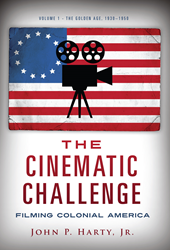New York, NY (Top40 Charts) Volume 1 of a planned 3 volume study of colonial films in the twentieth century (1930-2000.) Together they will represent the most in-depth study available on colonial movies.
The goal of this study was to discover how each colonial film represented America's socialpolitical history and how the films encapsulated the state of mind of the American people at the time of their release
Why did cinema largely ignore the colonial era and the Revolutionary War? The Cinematic Challenge: Filming Colonial
America asks this question and studies four films from the 1930s and 1940s to consider other queries, such as:
How did Darryl F. Zanuck make a film about the American Revolution (Drums Along The Mohawk) without indicating that the British were the enemy?
Why was Northwest Passage never completed?
How did Cecil B. DeMille begin production on a film (Unconquered) based on a book that did not yet exist?
In addition, readers will learn how accurate the depictions of colonial life were in each film and whether the political and economic climate affected the finished products.
Volume one of The Cinematic Challenge also includes information about the general state of the film industry during this period, technological advancements, and rival theories about historical film making, making it the most in-depth resource available today on colonial movies.
To begin the book, John P. Harty, Jr. poses two questions: "How hard was it to make a successful colonial film?" and indirectly the second "Why were so few films made about this remarkable period?" To answer these questions, Harty looked at thirteen of the most important colonial films made in the twentieth century. This study compared the source (book, play or original story) upon which the film was based to the completed film in order to see how the screenplay was developed.
About the Author
Working as a stagehand at NBC for thirty years gave author John P. Harty, Jr. an inside look into the world of television and film and eventually inspired his creation of The Cinematic Challenge. He holds a Bachelor's Degree in History from St. Bonaventure University, a Master's Degree in Political Science from Fairleigh Dickinson University, and has studied Russian and English history at the doctoral level at New York University. For more information, visit his website: CinematicChallenge.com























